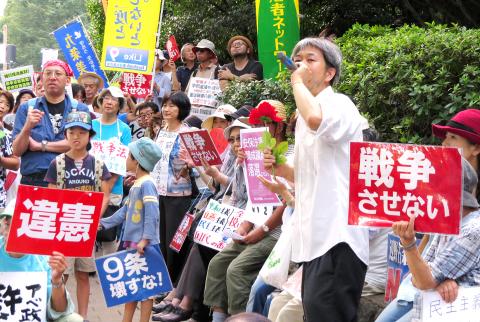Japanese opposition groups yesterday vowed to challenge laws passed overnight that clear Japanese troops to fight abroad for the first time since World War II, while Beijing voiced concern.
Japan’s ruling coalition, led by Japanese Prime Minister Shinzo Abe, pushed the laws through in the early hours of the morning after days of tortuous debate that at points descended into physical scuffles in parliament.
For the first time in 70 years, the new regulations are to give the Japanese government the power to send the military into overseas conflicts to defend allies, even if the nation itself is not under attack.

Photo: AFP
Abe said the laws are necessary to protect against threats from an increasingly belligerent China and unstable North Korea, but opponents fear the vague wording could see Japan dragged into far-flung foreign wars.
“This is not an end,” said Renho, a senior lawmaker from the main opposition Democratic Party of Japan, who goes by one name.
“Let us make it the beginning of the beginning,” she said on Twitter.
Social Democratic Party senior lawmaker Mizuho Fukushima told a crowd who gathered outside parliament during the debate: “Abe’s Cabinet criminals... Let us get them out of here.”
China voiced its concerns, with its Ministry of Foreign Affairs saying the changes are an “unprecedented” change in Japan’s military stance since World War II, and urged Tokyo to “pay attention to security concerns of its neighbors.”
“We solemnly urge Japan to learn the lessons of history ... uphold the path of peaceful development and act cautiously in the areas of the military and security, and do more to help push regional peace and stability rather than the opposite,” it said.
Speaking after the vote, Abe said the changes were “necessary in order to protect people’s lives and peaceful way of life.”
“This is designed to prevent wars,” he told journalists.
A group of about 300 protesters gathered outside parliament, calling for the legislation to be abolished and vowing never to stop their fight against Abe.
“Our battle will never end. This is just the beginning,” said Keisuke Yamamoto, an organizer from one of the citizen groups that have been leading weeks of rallies. “We will resort to every possible measure, including bringing the case to the courts... We cannot let this movement fizzle out now.”

CHAOS: Iranians took to the streets playing celebratory music after reports of Khamenei’s death on Saturday, while mourners also gathered in Tehran yesterday Iranian Supreme Leader Ayatollah Ali Khamenei was killed in a major attack on Iran launched by Israel and the US, throwing the future of the Islamic republic into doubt and raising the risk of regional instability. Iranian state television and the state-run IRNA news agency announced the 86-year-old’s death early yesterday. US President Donald Trump said it gave Iranians their “greatest chance” to “take back” their country. The announcements came after a joint US and Israeli aerial bombardment that targeted Iranian military and governmental sites. Trump said the “heavy and pinpoint bombing” would continue through the week or as long

TRUST: The KMT said it respected the US’ timing and considerations, and hoped it would continue to honor its commitments to helping Taiwan bolster its defenses and deterrence US President Donald Trump is delaying a multibillion-dollar arms sale to Taiwan to ensure his visit to Beijing is successful, a New York Times report said. The weapons sales package has stalled in the US Department of State, the report said, citing US officials it did not identify. The White House has told agencies not to push forward ahead of Trump’s meeting with Chinese President Xi Jinping (習近平), it said. The two last month held a phone call to discuss trade and geopolitical flashpoints ahead of the summit. Xi raised the Taiwan issue and urged the US to handle arms sales to

State-run CPC Corp, Taiwan (CPC, 台灣中油) yesterday said that it had confirmed on Saturday night with its liquefied natural gas (LNG) and crude oil suppliers that shipments are proceeding as scheduled and that domestic supplies remain unaffected. The CPC yesterday announced the gasoline and diesel prices will rise by NT$0.2 and NT$0.4 per liter, respectively, starting Monday, citing Middle East tensions and blizzards in the eastern United States. CPC also iterated it has been reducing the proportion of crude oil imports from the Middle East and diversifying its supply sources in the past few years in response to geopolitical risks, expanding

OTHER OPTIONS: Given possible US intervention and Taiwanese counterattacks, China might opt to blockade Taiwan or take its outlying islands instead of an all-out invasion A US think tank has urged Taiwan to adopt a “hellscape” strategy that would flood the Taiwan Strait with drones and other uncrewed systems to deter invasion by China. In its report, Hellscape for Taiwan, published on Thursday, the Center for a New American Security said Taipei’s asymmetric defense approach — often described as a “porcupine strategy” — needs to evolve to keep pace with the growing capabilities of the Chinese People’s Liberation Army. The “hellscape” strategy involves saturating the air and waters around Taiwan with thousands of drones and other platforms capable of striking invading forces from multiple domains at once. Long-range